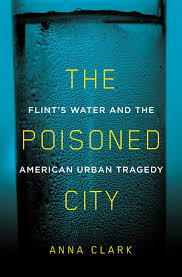
There are, by now, several books dealing, in part or entirely, with the Flint Water Crisis. If you only have time to read one of them it should be Anna Clark’s sweeping, thorough, rigorous, and lyrical overview of the crisis.
There are a number of things that make Clark’s account important, and I’ll lead off with one of the less likely, or at least, what is often the least recognized: its lyricism. There are voices who think that nonfiction, and particularly nonfiction that cleaves closer to journalism or science writing (as opposed to, say, the personal essay or memoir) are definitionally not “creative.” This is, of course, nonsense, and the best reporters and science writers (Rachel Carson, Stephen Hawking, and several others come to mind) have written in ways that rapturously convey the elegance, beauty, tragedy, and depth of their subjects. The Poisoned City is written in such a manner. The fact that it is preoccupied with the granular details of public policy, or organic chemistry, or Michigan municipal history, or environmental law does not keep it from a vivid depiction, in human terms, of its subject. And this is gratifying for those of us who have lived through the Flint water crisis (indeed, any of the millions in our country living through any environmental crisis; California’s wildfires are ranging as I type), because this kind of event is something that you feel in your gut as much as you apprehend it with your eyes or analyze it in your mind. A read that is pleasurable and engaging without diminishing its knowledge and usefulness is the best kind of reportage, and Clark’s skillful narrative prevents the reader from ever forgetting that these are real events that have affected (and continue to affect) real people.
Secondly, as any Flint resident knows, this is a dizzyingly complicated subject. The subject of environmental justice in Flint was already complicated before a grassroots coalition of activists blew the state cover-up in 2015, and before the Flint emergency managers switched the water source in 2014, and even before emergency management was imposed on Flint in 2011. It all goes back to the roots of neighborhoods like Civic Park in the 1940s under an enforced segregation whose buried legacies persisted in the pipes and infrastructure decades after court rulings and legislation abolished de jure housing discrimination. I noted with pleasure that Clark drew heavily upon Andrew Highsmith’s own seminal book Demolition Means Progress which charted the evolution of segregation in Flint over the city’s 150 year history, as well as Rhonda Sanders Bronze Pillars which provided one of the earliest and best surveys of Flint’s original segregated African-American neighborhoods.
Along with its lyricism, The Poisoned City‘s striking achievement is the ground it is able to cover, all rigorously sourced, within the space of just 288 pages, including endnotes. (And regarding the endnotes: half of the story is there, and readers will deprive themselves if they merely skim the text and don’t consider the prodigious sourcing and reference available here.) Within these pages Clark touches on Flint’s history of segregation, the development of public water systems in the U.S., landmark cases in environmental law, Michigan’s emergency manager laws, the process by which Flint embraced first the Karegnondi Water Authority and then then the switch to Flint River water, the process by which anticorrosive treatment was omitted from the city drinking water, the arc of the crisis from the original switch through grassroots activism, exposure and reportage, the legislative and legal response, and finally the ongoing fallout of the crisis (which is still unresolved over four years after the initial switch occurred).
I particularly want to recommend this book to citizens and advocates who have no relationship to Flint whatsoever. It demonstrates the extent to which Flint is not a unique case, but the ways in which its compounded vulnerabilities made this kind of environmental catastrophe all too likely elsewhere… something that can happen and which, indeed, is already happening all over the country today. It is, that is, a book from which everyone can benefit.